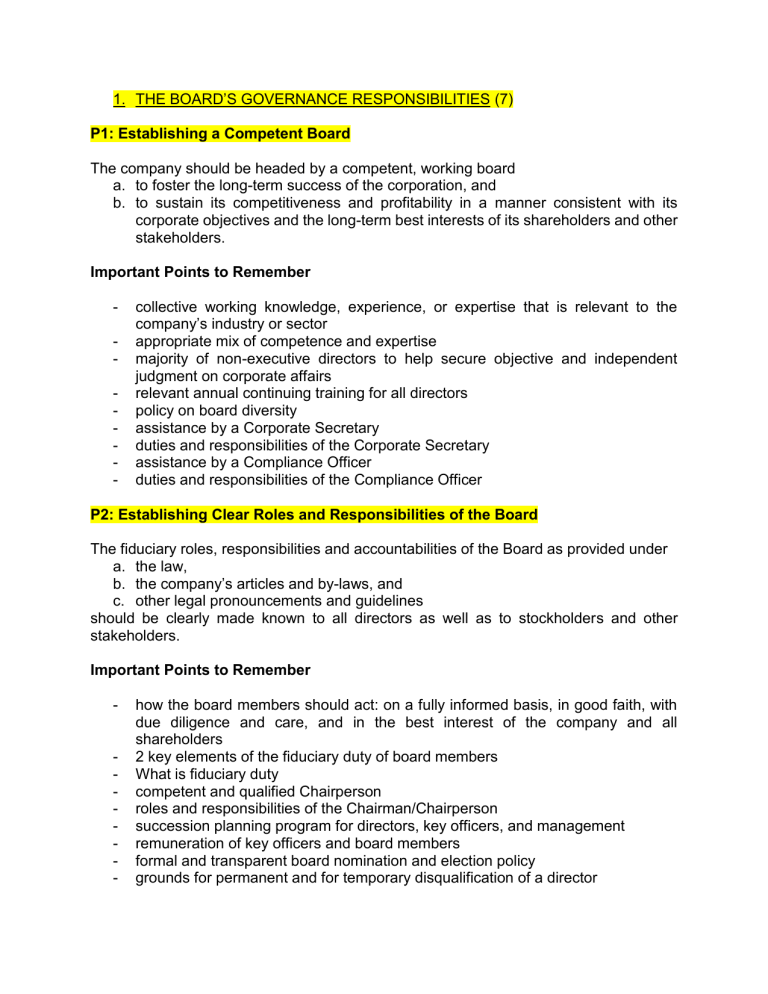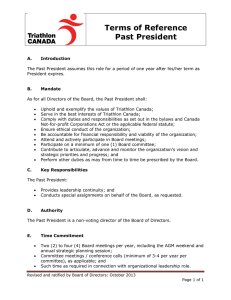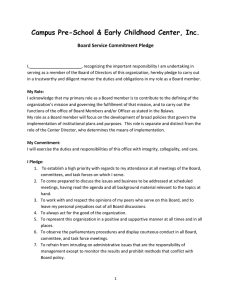
1. THE BOARD’S GOVERNANCE RESPONSIBILITIES (7) P1: Establishing a Competent Board The company should be headed by a competent, working board a. to foster the long-term success of the corporation, and b. to sustain its competitiveness and profitability in a manner consistent with its corporate objectives and the long-term best interests of its shareholders and other stakeholders. Important Points to Remember - collective working knowledge, experience, or expertise that is relevant to the company’s industry or sector appropriate mix of competence and expertise majority of non-executive directors to help secure objective and independent judgment on corporate affairs relevant annual continuing training for all directors policy on board diversity assistance by a Corporate Secretary duties and responsibilities of the Corporate Secretary assistance by a Compliance Officer duties and responsibilities of the Compliance Officer P2: Establishing Clear Roles and Responsibilities of the Board The fiduciary roles, responsibilities and accountabilities of the Board as provided under a. the law, b. the company’s articles and by-laws, and c. other legal pronouncements and guidelines should be clearly made known to all directors as well as to stockholders and other stakeholders. Important Points to Remember - - how the board members should act: on a fully informed basis, in good faith, with due diligence and care, and in the best interest of the company and all shareholders 2 key elements of the fiduciary duty of board members What is fiduciary duty competent and qualified Chairperson roles and responsibilities of the Chairman/Chairperson succession planning program for directors, key officers, and management remuneration of key officers and board members formal and transparent board nomination and election policy grounds for permanent and for temporary disqualification of a director - group-wide policy and system governing related party transactions primary responsibility for approving the selection and assessing the performance of the Management effective performance management framework Board’s oversight responsibility over an appropriate internal control system and a sound enterprise risk management (ERM) frameworks P3: Establishing Board Committees Board committees should be set up to the extent possible to support the effective performance of the Board’s functions, particularly with respect to a. audit, b. risk management, c. related party transactions, and d. other key corporate governance concerns, such as nomination and remuneration. The composition, functions and responsibilities of all committees established should be contained in a publicly available Committee Charter. Important Points to Remember - board committees that focus on specific board functions Audit Committee and its duties and responsibilities Corporate Governance Committee (CG Committee) and its duties and functions Board Risk Oversight Committee (BROC) and its duties and responsibilities Related Party Transaction (RPT) Committee and its functions Committee Charters P4: Fostering Commitment To show full commitment to the company, the directors should devote the time and attention necessary to properly and effectively perform their duties and responsibilities, including sufficient time to be familiar with the corporation’s business. Important Points to Remember - presence and active participation in all meetings of the Board, Committees, and Shareholders limit on board directorships P5: Reinforcing Board Independence The Board should endeavor to exercise objective and independent judgment on all corporate affairs. Important Points to Remember - minimum number of independent directors qualifications, disqualifications, and maximum term of an independent director roles and responsibilities of the Chief Executive Officer (CEO) lead director and his/her functions abstention of a director from participating in meetings on which he/she has a material interest non-executive directors P6: Assessing Board Performance The best measure of the Board’s effectiveness is through an assessment process. The Board should regularly carry out evaluations a. to appraise its performance as a body, and b. assess whether it possesses the right mix of backgrounds and competencies. Important Points to Remember - self-assessment of performance guidelines in determining Board performance P7: Strengthening Board Ethics Members of the Board are duty-bound to apply high ethical standards, taking into account the interests of all stakeholders. Important Points to Remember - adoption of Code of Business Conduct and Ethics implementation and monitoring of compliance with the Code 2. DISCLOSURE AND TRANSPARENCY (4) P8: Enhancing Company Disclosure Policies and Procedures The company should establish corporate disclosure policies and procedures that are a. practical and b. in accordance with best practices and regulatory expectations. Important Points to Remember - importance of establishing disclosure policies and procedure period to disclose any dealings in the company’s shares full disclosure of relevant and material information on individual board members and key executives - disclosure of remuneration policies and procedure disclosure of policies governing Related Party Transactions (RPTs) disclosure of material facts and events Manual on Corporate Governance P9: Strengthening the External Auditor’s Independence and Improving Audit Quality The company should establish standards for the appropriate selection of an external auditor, and exercise effective oversight of the same to strengthen the external auditor’s independence and enhance audit quality. Important Points to Remember - appointment, reappointment, removal, and fees of the external auditor Audit Committee Charter disclosure of the nature of non-audit services performed by its external auditor



